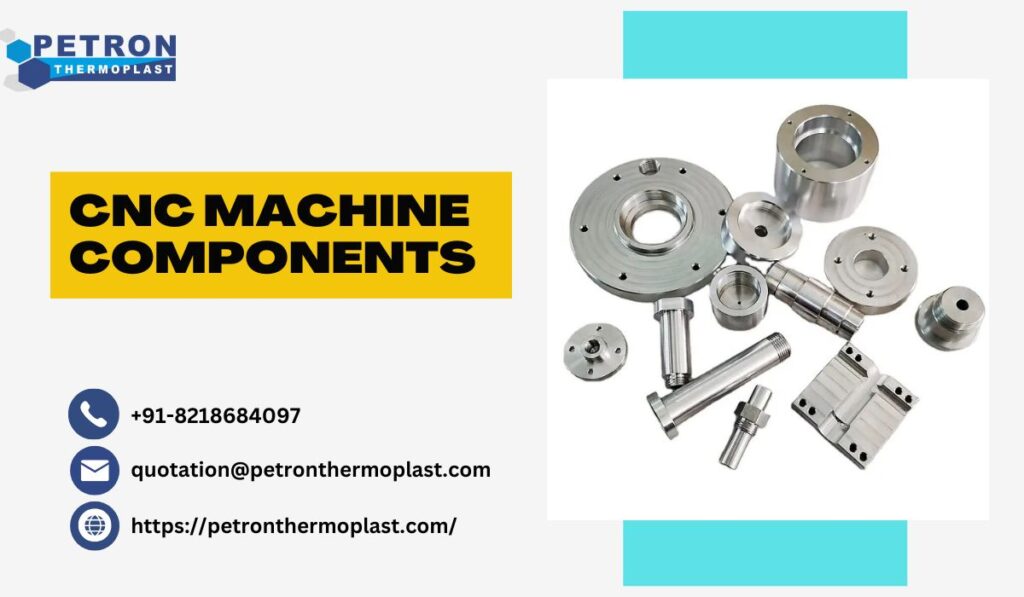CNC (Computer Numerical Control) machining is a cornerstone of modern manufacturing, enabling the production of precise, high-quality components for various industries. A critical factor in the performance and durability of CNC machine components is the choice of material. The right material ensures components withstand operational demands while maintaining optimal functionality. This blog explores the top materials used in manufacturing CNC machine components, highlighting their unique properties and applications.

1. Metals: Strength and Durability
Metals are a popular choice for CNC machining due to their exceptional strength, durability, and versatility. Here are the most commonly used metals for CNC machine components:
a. Aluminum
- Key Properties: Lightweight, corrosion-resistant, excellent machinability, and high strength-to-weight ratio.
- Applications: Widely used in aerospace, automotive, and electronics industries for components such as brackets, housings, and heat sinks.
b. Steel
- Key Properties: Exceptional strength, wear resistance, and versatility.
- Applications: Ideal for structural components, gears, and shafts in industries like construction and heavy machinery.
c. Stainless Steel
- Key Properties: Corrosion resistance, strength, and aesthetic appeal.
- Applications: Used in medical devices, food processing equipment, and chemical processing components.

d. Brass
- Key Properties: Corrosion resistance, excellent thermal and electrical conductivity, and easy machinability.
- Applications: Common in plumbing, electrical fittings, and decorative components.
e. Titanium
- Key Properties: Lightweight, strong, corrosion-resistant, and biocompatible.
- Applications: Used in aerospace, medical implants, and high-performance automotive parts.
2. Plastics: Lightweight and Versatile
Plastics offer a lightweight and cost-effective alternative to metals, with unique properties that make them suitable for specific applications.
a. PEEK (Polyether Ether Ketone)
- Key Properties: High-temperature resistance, chemical resistance, and excellent mechanical strength.
- Applications: Used in aerospace, medical, and semiconductor industries for components like seals, bearings, and insulators.
b. Delrin (Acetal)
- Key Properties: Low friction, high wear resistance, and excellent dimensional stability.
- Applications: Ideal for gears, bushings, and precision parts in machinery and automotive systems.
c. UHMWPE (Ultra-High-Molecular-Weight Polyethylene)
- Key Properties: High impact strength, low friction, and resistance to abrasion and chemicals.
- Applications: Used in conveyor systems, liners, and wear strips.
d. Nylon
- Key Properties: High strength, durability, and resistance to wear and chemicals.
- Applications: Suitable for gears, bearings, and pulleys.
e. PVC (Polyvinyl Chloride)
- Key Properties: Cost-effective, chemical-resistant, and easy to machine.
- Applications: Common in fluid handling components and piping systems.
3. Composites: The Best of Both Worlds
Composites combine the properties of multiple materials to deliver superior performance. They are often used in applications requiring high strength-to-weight ratios and resistance to extreme conditions.
a. Carbon Fiber Reinforced Polymer (CFRP)
- Key Properties: Lightweight, exceptionally strong, and resistant to fatigue.
- Applications: Used in aerospace, automotive, and sports equipment for structural components.
b. Fiberglass Reinforced Plastic (FRP)
- Key Properties: Lightweight, corrosion-resistant, and cost-effective.
- Applications: Common in chemical processing equipment and construction materials.
4. Specialty Materials: High Performance for Unique Needs
Certain applications require materials with highly specific properties to meet demanding operational conditions. Here are some specialty materials used in CNC machining:
a. Inconel
- Key Properties: High-temperature resistance and corrosion resistance.
- Applications: Ideal for aerospace, marine, and chemical processing components.
b. Tungsten
- Key Properties: Extremely dense, strong, and heat-resistant.
- Applications: Used in aerospace, military, and electrical applications.
c. Teflon (PTFE)
- Key Properties: Non-stick, chemical-resistant, and high thermal stability.
- Applications: Common in food processing, medical devices, and chemical industries.
Factors to Consider When Choosing a Material
Selecting the right material for CNC machine components depends on several factors, including:
- Operational Environment
- Consider temperature, pressure, and exposure to chemicals or corrosive agents.
- Mechanical Requirements
- Evaluate the need for strength, hardness, and wear resistance.
- Machinability
- Choose materials that can be easily machined to achieve precise tolerances and finishes.
- Cost
- Balance performance requirements with budget constraints.
- Industry Standards
- Ensure the material meets industry-specific regulations and certifications.
Why Choose Petron Thermoplast for CNC Machine Components?
At Petron Thermoplast, we specialize in manufacturing high-quality CNC machine components using a wide range of materials tailored to your specific needs. Here’s why we are the preferred choice:
- Material Expertise
- Our team has extensive knowledge of materials and their applications, ensuring optimal performance.
- State-of-the-Art Facilities
- With advanced CNC machining capabilities, we deliver precision and consistency in every component.
- Customized Solutions
- We work closely with clients to select the best material and design for their applications.
- Commitment to Quality
- Our strict quality control processes ensure every component meets the highest standards.
- Sustainable Practices
- We prioritize eco-friendly manufacturing processes to reduce environmental impact.
Conclusion
The choice of material plays a pivotal role in the performance and longevity of CNC machine components. Whether it’s metals for strength, plastics for versatility, or composites for lightweight durability, each material brings unique benefits to the table. At Petron Thermoplast, we provide expert guidance and precision-engineered solutions to help you select and utilize the best materials for your CNC machining needs. Contact us today to discuss your requirements and discover how we can enhance your operations with high-quality CNC machine components.

